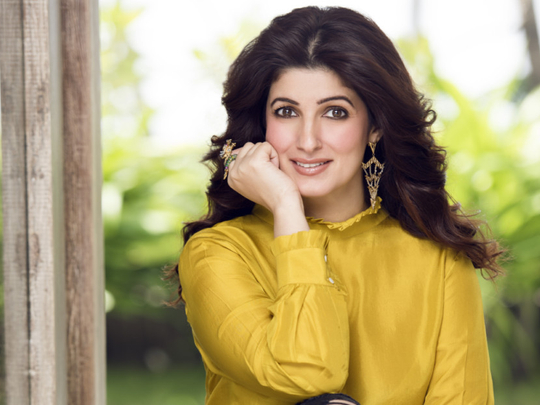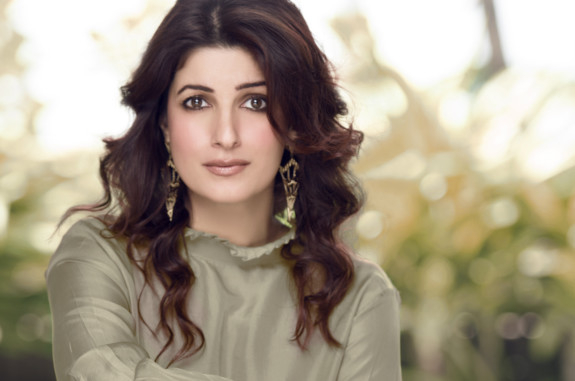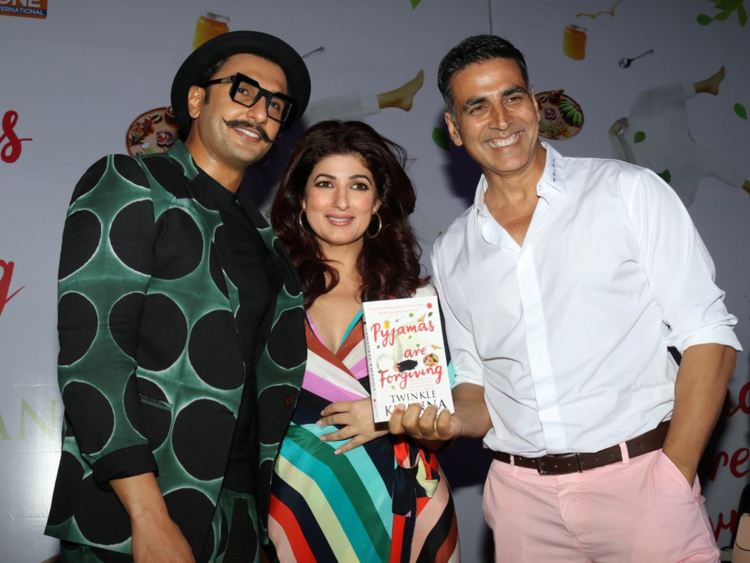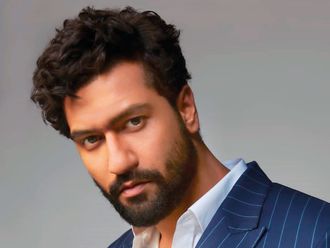
Indian author, actress and film producer Twinkle Khanna compares herself to a vampire who sucks the blood out of life experiences and the people she encounters, so as to infuse life into the characters in her books.
It’s a morbid analogy, but for someone who has grown up on a steady diet of fantasy fiction spun by the likes of American novelists Isaac Asimov and Ursula K Le Guin, it fits.
“My uncle used to read a lot of science fiction and he collected a lot of comic books. He would pass me all his hand-me-downs… I read primarily science fiction,” said Khanna, who released her debut novel Pyjamas Are Forgiving this month.
Born into a family of actors (Dimple Kapadia and late actor Rajesh Khanna), the geek-chic wife of Bollywood A-lister Akshay Kumar was warmly embraced for her witty writing rather than her acting prowess.
The mother of two comes across as an anti-thesis of a privileged Bollywood insider with her self-deprecating, vanity-free personality.
Her formative years weren’t a slew of glittering bashes and Bollywood film premieres resembling the Gossip Girl series as you would expect either. Khanna, 43, escaped into the world of literature at every opportunity she got and that shaped her existence.
“What was interesting is that it defined my perspective. In those books, gender or nationalism wasn’t an issue… We are talking of different planets… So where are the barriers? I lived in a complete world of possibilities, not even probabilities,” she said.
Her dream as a writer is to entertain, a goal that she has achieved with her anthology of short stories The Legend Of Lakshmi Prasad and non-fiction book Mrs Funnybones.
“I like to make my readers laugh at the absurdities of life… I would not want to give them a sermon ever.”
Excerpts from our interview with Khanna as we discuss Pyjamas Are Forgiving, her breech birth, writer’s block and how she’s an editor’s dream…
Without sounding ageist, would you call yourself a late bloomer?
I’m making up for lost time. From the time I was born, things have been upside down because I came out with my feet first. So, I’ve not followed a regular progression right from the beginning.
When a lot of people look at other people’s lives or work and say: ‘Oh my God, that’s such a stroke of good luck or good fortune’, the reality could be different because that somebody may have been preparing for a very long time. My world has been filled with words ever since I could remember. I was a voracious reader. I learnt how to read at three and my sister learnt at five. It’s not a big point, but still. It’s something in my 40s that I can push [my sister] down with.
Is that your bragging rights with your sister …
Yes, it gives me bragging rights. My sister is also a voracious reader, so I think it was just the way we grew up. When I look back, my writing was inevitable. I thought it would be much later in my life when I hit 60 and my kids have gone or settled down. I thought I would write when I got time on my hands or when I turned a lot wiser at 60. At 40, I don’t know if I am wise enough, but I am writing.
How did you cultivate the discipline needed to write a novel? I need deadlines to function…
Like you, I love deadlines. They are the wrecking ball to writer’s block. When you are writing columns, you don’t have the privilege of saying I have writer’s block, you just have to come up with something.
I like to sit down at my desk early in the morning, just after my kids go off to school and when the house is peaceful. At that time my phone is like a dead body on my side, nobody is calling me and I don’t have my staff asking me ‘aaj chicken banana hai ya mutton’ [do we make chicken or mutton today?]. It’s relatively peaceful when I write. About discipline, I have been writing columns now for more than five years and that discipline helped while writing a book. But I was that one person who kept calling my editor to give me deadlines. Without them, I am unable to function as I procrastinate.
So what was your favourite displacement activity to put off writing… retail therapy?
Spending time on Twitter was my way of procrastination. I am not into retail therapy. I wish I was, then I would be better dressed.
You are being self-deprecating and it’s a rare trait among people in the entertainment industry who are proudly narcissistic. Do you consider yourself a misfit?
They relate to me because they find me amusing. When I was an actress, I felt that being narcissistic was a prerequisite for being in the entertainment industry. Think about it: it’s not possible to face so many people constantly without thinking you do have something extraordinary in you. I wasn’t that person though. My strengths were in different areas and I was never focused on my appearance much. For me, that’s transitory.
So you like keeping it real. Even your character in your book, Anshu, seems to be real. Was she a figment of your imagination or did you draw her from anybody you knew?
I don’t think there’s anyone who writes without drawing from the people they know. We’re vampires, we have to suck their blood in order to give blood to our characters. So she’s an amalgamation of a lot of people I do know. Also I would say you can’t write without pouring some features of yourself into these creatures — these ink and paper creatures. And so I don’t think it’s any one person, but you form your character from the various people you know and from your life experiences.
The protagonist in your novel is liberal and contemporary. Did you keep her political correctness in your head?
She’s a woman who’s strong, but she’s led by her own foibles too. There is a myth about this empowered woman going through life, striding through it fiercely. But it’s not like that. Even if you are strong, and liberated, you still have a lot of weaknesses.
Speaking of that, there’s a stereotype of an empowered woman — either they are sexually promiscuous or they swig alcohol. Were you aware of that while you were writing your novel?
I read an article recently about that. Yes, there’s a stereotype of a liberated women swearing, drinking and being promiscuous. A lot of young people are like that and that’s the world they are growing up in. When I was creating Anshu as a modern liberated woman, she drinks. But she drinks as much coffee as wine. I don’t think she’s particularly promiscuous and she’s not a smoker. You draw from life here.
You have touched upon what constitutes consent in physical relationships. It’s a burning topic ever since the #MeToo movement has gathered momentum around the world. Was that by design to touch upon a topical subject?
There’s obviously a movement around the world and when you write, you have to interpret it and filter it through. If we say we have not been affected by the #MeToo movement then that we are not being completely honest. Apart from looking at men and their ingrained behaviour patterns, there are so many times when a woman out of sheer politeness or the inability to say ‘no’ or to defer refusal, they end up in a situation that they had never planned to be in. That’s something I wanted to capture. The other interesting thing was about a conversation I had with a friend where he was telling me about his encounter with a woman. They talked late into the night — talking about everything including her tattoo on her leg to her mole on her arm — but when he finally went to kiss her, she said ‘no’. At that point, he said: ‘I didn’t know if I continued, if I would be a harasser and if I stopped would I be a loser?’. It was interesting that men are now actually thinking about these things. Maybe even a couple of years ago, this never occurred to them and that conversation was one of the basis of my narrative.
How involved was your editor in your book and were you okay with your text being edited when you became too verbose?
With this book, we ended up chopping 11,000 words. At that point, I felt she’s cutting off my right kidney. But after a week of stepping back and looking at it in perspective, I had to concede she was right. And when it comes to editing, I am easy person. My editors in the past [with prominent Indian English dailies] would say I’m not one who has a large ego. My words are precious to me, but I won’t hold on to it if they’re not worthy. I am an editor’s dream. I don’t know if I’m a reader’s dream but I’m an editor’s dream. About being verbose, she tells me why are you using ‘rambunctious’ when you can use ‘loud’, why are you using ‘languorously’ when you should be using ‘lazily’?
Has your 16-year-old son read your book?
Yes, he has read my book. He heard the story when I made him a captive audience. I trapped with a seatbelt in a plane where he couldn’t move until I finished narrating all my stories. I had two alternative ends for this book and he helped me choose. My little one is a bookworm. She reminds me a lot of what I was like as a kid.
When I think of a child from an acting dynasty, I think they lead party-fuelled glamorous lives. But you seem to have enjoyed a sedate upbringing…
Now, who’s living in the world of stereotypes? You can’t put all of Bollywood in one stereotype. There are people who enjoy different things — some are outdoorsy and some are more sport-oriented. Some like me like to read and everyone is not a shopaholic. But they are all workaholics. It looks very easy from the outside but most of them have this large drive and determination to succeed. Bollywood is not all partying.
DID YOU KNOW?
Twinkle Khanna, who loves sci-fi novels and comics, is a DC fan and not a Marvel one.













